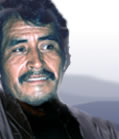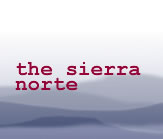 |
 |
||
 |
|||
|
RELATED THEMES traditional skills OTHER LOCAL THEMES BACKGROUND |
health
Narrators talk of past and present health problems in the communities, and of efforts to improve access to health facilities. High infant mortality from malaria and other diseases provoked a re-siting of the village of Tiltepec to a location higher up the valley (Mexico 1): "Where we are now is good for us, that's why there are a lot of children now. Before it wasn't so good because the children were dying from every type of disease. Before we used to say they had 'caballo' (literally, horse) - now we call it a chest infection; they couldn't breath well. Well, before there were few children and now there are many young people. Well, it's changed a lot now that we have moved the village, they don't die so easily now." Loss of eyesight through "river blindness", which is still found in the region, affected the same community. One community member's health problems are attributed to working in a mine as a young man: "I reckon this illness could be because of working in the mine. One doesn't breathe pure air.if you go with the contractor, in the work, well, the air is pure oil, just smoke from the machine, that's what you take in" (Mexico 13). He is not the only narrator to mention the health hazards of being a migrant labourer, especially in Mexico City: "In Mexico City, in a factory, you'll definitely get some disease because of the air pollution, or simply from the car exhaust.people in the village have less illness than those who live in Mexico City" (Mexico 7). Local diet is changing, reports one narrator (Mexico 19), implying that the health consequences are not all good: "Now the people are eating eggs, meat.canned sardines, all that. The old people say that they ate more beans and herbs before, they lived off that, and salsas (sauces) and avocados. and mushrooms - of which there's more than anything here. Everything's changing now, people have forgotten about guias (local name for edible leaves of young plants) and mushrooms; now they're almost only eating meat. With meat, well, one doesn't know.how the animal grew up.what diseases it had, if it died well or alone, who knows?" An elder member of Ixtlán (Mexico 16) describes how access to medical services has improved during her lifetime: "There almost weren't any doctors, if you weren't in Guelatao or Oaxaca. that's why they said that those who got sick went to Guelatao because that was the first place where there was a doctor and in the villages there were healers, people that cured with natural remedies. in the other villages, they said that there were healers who also used witchcraft .After that they took steps and the health centre [was built] that was over there." One narrator is a doctor using traditional remedies. She has also become a health promoter, travelling to different villages in the Sierra Norte and passing on her knowledge and training. She treats, for example, high blood pressure (Mexico 4), using plants which are known to have the correct medicinal properties: "It's treated with zapote blanco (white-fleshed fruit of casimiroa edulis; the tree's leaves, bark and seeds contain a glucoside which can act as a sedative or analgesic)], tila (flowers/fruit of the tilia mexicana used for infusions to calm the nervous system; alleviate indigestion and insomnia), passion flower (passiflora spp, plant with several therapeutic qualities, including sedative) and diente de león (dandelion, Taraxacum officinale). There are many plants for high blood pressure; these are some that we give daily for a while so that the high pressure improves. It's quick [to cure], they drink the tea, about two or three cups, and then one checks the blood pressure and it's dropping. The tea is only for when the pressure is high: the plants are strong and the pressure will drop." But another narrator (Mexico 25) tells of how her high blood pressure is being treated by a doctor, who has told her to ignore any traditional remedies: "I never got sick [as a child]. That's why it took me by surprise when I got high blood pressure. Now that I am sick, I am just taking pills. The [doctor] told me, 'Take three pills daily, three pills for a month, and [leave] the herbs on one side.' Yes, that's what happened, I got used to only pills. and I don't pay attention to the little herbs." quotes about health"I collect [the medicinal plants] in my community; I dry them, I process them, and I make ointments, tinctures, cough syrup, soap for dandruff, for hair loss, for cleaning wounds. We use the natural resources we have in our community; allopathic medicine is expensive now." "God knows how.they gave birth to the children. [The babies] rarely died.[and] they [were] also treated with natural remedies. In spite of the situation [in the past] the women also came out of childbirth well." "But thinking about it, well, they live better [in the village]. there isn't any [noise], just the sound of the birds and a car now and then, right? So it's a lot calmer here, the people are better, they are healthier than people from Mexico City. In Mexico City, in a factory, you'll definitely get some disease because of the air pollution." "In 1980 I was a rural community health assistant for the IMSS (Mexican Institute of Social Services). From there the way opened up - I got into an institution called the National Nutrition Institute (INN). After being an assistant I took on the position of health promoter with this institution. Then a training centre was opened for the training of community health promoters and I gained a lot more knowledge there.[as well as by] exchanging experiences and knowledge with colleges from other communities." |
|